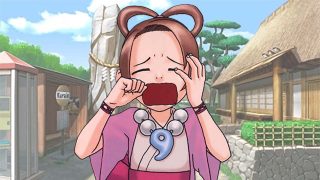Shadowmanwkp asked a question that isn’t necessarily about games and not necessarily about English, but it’s an interesting subject, so let’s take a look:
I have watched a few movies and seen a very particular translation of the word “harakiri” (a very specific kind of suicide). At every instance the word is said in Japanese, the Dutch subtitles actually use the word “seppuku”. I found this jarring in particular, because translating the word harakiri to seppuku in every instance would not always fit the tone. From my understanding seppuku is a milder way to put things, comparable to saying “taking your own life” instead of “suicide”, but there’s probably more nuance to it than that. Because I do not speak Japanese, and never lived in Japan, I’m curious what your perspective on this matter is.
For some reason this sounds really familiar to me, like I’ve seen it before myself, or maybe I committed this act of wackiness myself in one of my own translations in my early years? I doubt the latter is the case, but for some reason it just sounds so familiar.
In any case, let’s start with seppuku. In Japanese, it’s spelled 切腹. The left kanji means “cut” and the right kanji means “belly”. Together, it refers to the old act of ritual suicide by cutting your belly open. There’s more to it than that, but for the nitty gritty details I’ll just point to the Wikipedia article.
So what’s harakiri? In Japanese, it’s written 腹切り… and, as you can see, it uses the same kanji. It actually refers to the exact same thing – it’s just another word for it.
It’s hard to explain in just a few sentences, but basically “seppuku” is the more formal name that you’d see used in documents and such, while “harakiri” is less formal and what you might hear people say out loud in informal settings. You probably wouldn’t find it used in official documents. Of course, language is never that black-and-white, so don’t take those as rules that are set in stone or anything.
So the question then becomes, “Why did these subtitles change harakiri to seppuku?”
Not being Dutch I can’t say for sure, but my hunch is that “seppuku” is probably the more commonly known word outside of Japan, given that it’s the more formal term. In America, I feel like “seppuku” is known more than “harakiri”, although thanks to World War II veterans returning from Japan, “hari-kari” is the most well-known of them all. I cringe every time I hear someone say it, though 😯
So my guess is that because “seppuku” is more commonly known than “harakiri”, the translators felt it made more sense to use the more commonly known term for what’s actually the exact same thing. It’s definitely jarring to come across, but I guess it’s done out of consideration for people who might only know the more commonly known term. We people who know both terms don’t need that extra crutch, so it really shouldn’t bother us too much… but it somehow does, heh. I don’t know why that is.
Actually, there’s an added layer to consider – words imported from other languages often start to take on a life of their own and absorb new meanings and nuances. Since I don’t speak Dutch I can’t really say what new nuances “seppuku” and “harakiri” might have in that language. In American English they still mostly refer to the actual act of suicide by disembowelment, although sometimes in business contexts I hear it used simply as a fancy way of saying “suicide”. So maybe these altered nuances I’m not aware of are part of the reason why the translators chose “seppuku” over “harakiri”.
Anyway, that’s what’s up with seppuku and harakiri. And be sure not to call it hari-kari – use this to help you remember.


![Passport to MOTHER 2 [Learn Japanese!] Passport to MOTHER 2 [Learn Japanese!]](https://legendsoflocalization.com/wp-content/uploads/2018/05/pp-m2.jpg)



I made a WarioWare: DIY game about seppuku once. You have to tap the sword to stick it in your stomach. I thought it was pretty funny.
I all-too-often hear people say that “hari-kari” nonsense. I even more commonly see it spelled as, “harry carry”. It makes me want to “harry carry” them. So to speak.
This reminds me of The Last Samurai. In one line, a woman says, quite simply, “sumimasen”. Which, to me, is a polite sort of way of saying sorry, like saying, “excuse me”. The subtitles translate this as, “Please forgive my weakness”. I don’t claim to know anything about old school Japanese, but I can’t help feeling that’s somehow terribly wrong. xD
Yeah, that does sound like they were trying to overly flower the translation there. XP
The opposite is far more likely given that it has a purely English pedigree, not Japanese.
I dunno, maybe that translation made sense in context? I’d have to watch the scene (again, lol), but it could be the case that saying “sumimasen” in Japanese alone would suffice, while in English a simple “I’m sorry” wouldn’t.
Also there’s the use of “sumimasen” as a means of saying “thank you”, but this use remains obscure for some reason, even though it’s somewhat common.
Ironically, I just watched The Last Samurai last night, and stumbled upon this website today (to check the difference between harakiri and seppuku).
I remember that scene:
She wants to commit suicide, and asks her brother for permission, but he basically tells her to deal with it, and that is how she responds. She only says “sumimasen,” which can be translated into “excuse me” or “sorry,” but because of the context, she is actually saying “I’m sorry/Please forgive me (for being weak/for my weakness).” The last part is omitted because the Japanese listener know what she’s apologizing for. However, we Westerners need everything spelled out for us, hence the translation.
Hope that helps!
interestingly Code of the Samurai for the PS2 (a fairly obscure Europe-only localisation of Red/Sega’s Shinsengumi Gunrou Den) does the exact opposite – one character clearly says “seppuku” in Japanese but it’s subtitled as “harakiri”.
I know that game, thanks to Chaos Wars. =3
Personally, i’m more used to the term Harakiri then seppuku. Probably cuz i heard harakiri first via one of the Mortal Kombat games, and didn’t first hear the word seppuku until like a year later on some tv show. So, yeah, i’m much more familiar and comfortable with the h word.
On the subject of butchered Japanese words, I hate it when it’s pronounced “KEH-REE-OH-KEE”. It’s not even spelled that way in English! It really confused me as a kid since my family is Cantonese and it’s pronounced closer to the original Japanese in that language.
Probably ’cause “kah-rah-oh-ke” is actually pretty unnatural in English. I mean there’s that “ah-oh” diaresis in there, which I’m pretty sure isn’t in English (I may need to think harder about that, though), and, well, it would end with a “keh”, and very few words in English end on an “eh”. Maybe it’s closer in Cantonese, but I’d also imagine karaoke as pronounced in Japanese doesn’t sound as unnatural in Cantonese.
That being said, the best approximation in English without making people pronounce things that feel weird would be something like “kah-row-kay” which just sounds… ew. I’d much prefer ““KEH-REE-OH-KEE”” over that.
Funny enough, “KAH-ROW-KAY” is actually more or less how it’s pronounced in Cantonese.
But is that really that much better than in English? It still ends on a “kay”, and an entire syllable gets deleted, that’s also quite a bit!
Maybe not, but it does sound closer to me, anyway.
Also, it might be more the disconnect from the spelling that bothers me. I might not have minded as much if they spelled it the way they say it.
The way people pronounce “hari-kari” is only okay if they’re talking about the late Chicago Cubs broadcaster: http://en.wikipedia.org/wiki/Harry_Caray
Apropos of nothing: Chip Caray should commit seppuku and save us any further broadcasts.
Actually, the mis-pronunciation is likely because of the Old-time Cowboy Actor also named Harry Carry (started in the silents and was working up through WWII, was one of John Wayne’s mentors.
The Broadcaster wasn’t even doing Cardinal names when the word entered English.
I remember seeing the term harakiri in a Calvin and Hobbes strip. This furthers my belief that family-inappropriate things are fine if you use a foreign language.
Hey, hari-kari may be bad, but there’s so much of that in the other direction. Granted, syllabaries are far less flexible than alphabets. Still, you things like purin (should be pudingu), mishin (mashiin), and tsuu (tuu). However, those examples are very old, I believe. A closer comparison is between Japanese loanwords from other languages versus how we pronounce tsunami as “sunami” because ‘ts’ at the start of a syllable takes some getting used to.
You also have “katsuretsu” which I’m sure if transliterated today would be more like カットレット. But I dunno, I mean I don’t see the need for everyone to learn to pronounce “ts” at the beginning of words? Especially if it’s just for one word. Not like we don’t do it already, I mean we ignore p in pterodactyl, or the g in Gnostic, but those letters weren’t silent in Ancient Greek (and if you don’t believe me, see “helicopter” and “agnostic”).
In Spain it’s the opposite, nobody knows what a “seppuku” is and people use “harakiri” instead. Or “Arakiri” since Spaniards suck at foreign languages; shame as “seppuku” would be pronounced fine :P.
That’s the same thing in France.
Actually, there was a satirical newspaper named Hara-Kiri, in the 60s.
The more you know…
The word “harakiri” appears in later Mortal Kombat games. Just something I wanted to say.
Also while we’re on MK: Mato, I heard that MK is widely disliked among the Japanese. Is that true, and why or why not?
So that answers that. I watch the annual NHK Taiga Drama here in Los Angeles and whenever harakiri is mentioned, the subbers call it harakiri on the translated text. The station that I watch the show is a local station called UTB and they sub all the shows that come from Japan to be air locally here in Los Angeles so I was wondering if there was a difference between the two phrases. Now I know.
Now can you answer this: Why is the term ‘bakufu’ translated as ‘shogunate’? Even my brother thought shogunate was the japenese term and so did I until I paid attention to what the actor was saying compared to the translated subs.
Looking around the English and Japanese Wikipedia, I think 幕府 (bakufu) is the Japanese word for shogunate.
Let’s just have Wikipedia explain:
“A shogun’s office or administration is known in English as the “office”. In Japanese it was known as bakufu (幕府) which literally means “tent office”, and originally meant “house of the general”, and later also suggested a private government. Bakufu could also mean “tent government” and was the way the government was run under a shogun. The tent symbolized the field commander but also denoted that such an office was meant to be temporary. The shogun’s officials were as a collective the bakufu, and were those who carried out the actual duties of administration while the Imperial court retained only nominal authority.”
And further
“The term bakufu originally meant the dwelling and household of a shogun, but in time it came to be generally used for the system of government of a feudal military dictatorship, exercised in the name of the shogun; and this is the meaning that has been adopted into English through the term ‘shogunate’.”
My mother used to say “hari-kari” when I was a kid. I had no idea the origins of the word, not even what she meant for a while. Now I’m 28, and I long since know better…if she ever uses that word again, as much as she hates it when I correct her English, I’m gonna feel compelled to correct her anyway – to make up for years of not doing so out of ignorance, and with the excuse that “Technically, I’m correcting your Japanese. You never said not to do that.”
I am not sure, but having talked once to a Devianart japanese guy pal of mine, from what I got and I remember as of now, there is something akin to ‘japanese-nihon’ reading and ‘chinese style’ reading of characters… One is the former, one is the later…
Fist of the North Star-Hokuto no ken may have used it for the Nanto Goshasei titles as well by example….
Curiously the word “harakiri” was borrowed into Dutch from English, as this etymological website shows (it’s in Dutch – I was surprised the word even had a lemma in the first place):
http://etymologiebank.nl/trefwoord/harakiri
The Afrikaans dictionary says it was first attested in English in 1856 as “hari-kari”. This English website gives the same date, but it doesn’t mention the ugly variant: http://www.etymonline.com/index.php?term=hara-kiri&allowed_in_frame=0
Strange enough the dates for the earliest attestation in Dutch vary (1899, 1877, 1886, in the order of the site). The most recent Dutch dictionary gives the earliest date of use, so that’s likely the accurate figure for the earliest known attestation.
“Seppuku” seems to have entered English in 1871 (several sources give this year): http://www.merriam-webster.com/dictionary/seppuku
The Dutch etymological dictionary from 1997 claims that the “normal word” is “seppuku” by the way. Maybe the translators held the same belief. (But “harakiri” is the more common one in Dutch, both in daily use and in dictionaries.)